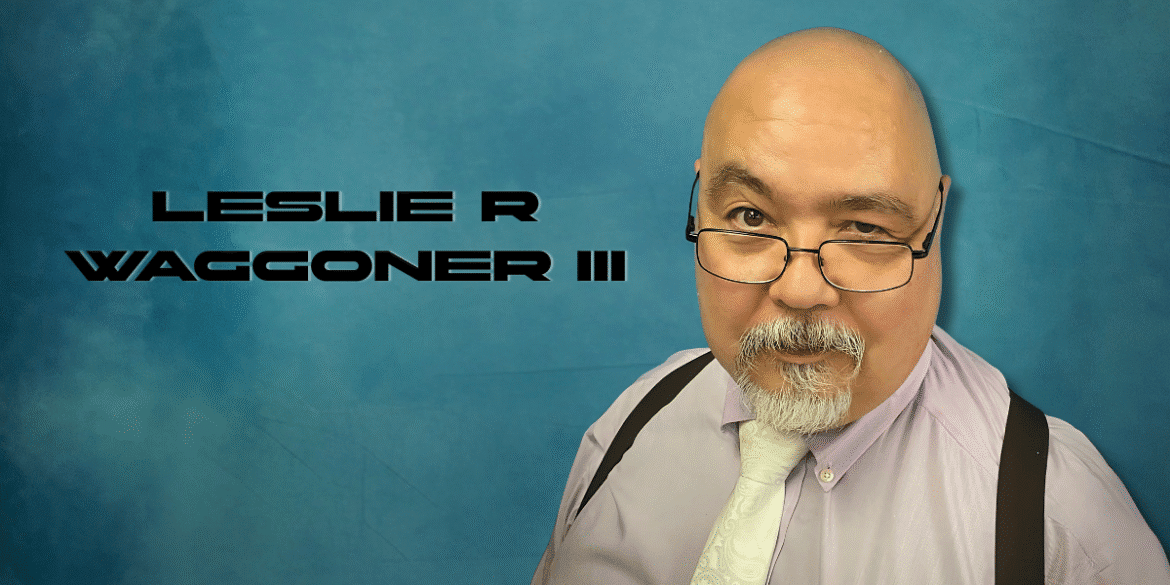Leslie R. Waggoner III spent four decades fixing what was broken, servers that crashed at midnight, networks that failed during critical presentations, systems that refused to cooperate no matter how perfectly the code was written. Then, at fifty-eight, something inside him shifted. Not the kind of turn that sends you to therapy, but the kind that sends you to your keyboard to invent an entire civilization from scratch, complete with its own language, script, and the kind of dense, ambiguous prose that makes modern editors weep.
The moment of transformation came quietly. After another day of solving problems with predetermined solutions, Waggoner found himself staring at a blank document. He had recently completed the registration of his family coat of arms — an exercise in heraldry that forced him to think in symbols, colors, and the tension between chaos and order. That visual language lingered. Instead of writing documentation or troubleshooting guides, he began shaping a story around those emblems. What emerged had no manual, no best practices, no Stack Overflow thread to reference. He started building Hadokai Tubatonona, not just a language, but a complete linguistic system with its own font, its own grammar, its own way of seeing the world. It was the first problem in forty years that didn’t have a right answer.
Most people experiencing a midlife crisis buy a sports car. Waggoner built an entire universe. The Heater and The Hack: Chronicles of the Dance, RCotD -:- Tome I emerged from what he modestly calls “a small writing exercise,” though there’s nothing small about creating a functional constructed language or designing a custom font to display it. The project consumed two years of his life, during which he transformed from someone who fixed broken systems to someone who built impossible ones.
The publishing world didn’t know what to do with him. Here was a sixty-year-old debut novelist who refused to follow the rules. While writing workshops preach the gospel of minimalism, cut every adverb, eliminate every trace of ambiguity, streamline until the prose runs like water, Waggoner chose density. He chose complexity. He chose to preserve what he calls “the hesitations and rhythms” that give language its humanity. His editing philosophy sounds more like a manifesto: “If I lose too much to minimalism, I rethink the edits. Holding my voice is worth more than a higher review score.”
This rebellion against literary conformity mirrors something deeper, a rejection of the narrative that creativity belongs to the young. In technology, forty is considered over the hill. In literature, debuting at sixty is almost unheard of. Yet Waggoner’s technical background didn’t hinder his artistic emergence; it weaponized it. Every system he’d ever debugged taught him to see patterns. Every network he’d configured showed him how complex systems interconnect. Every line of code he’d written prepared him to construct something far more intricate: a language that no one had ever spoken, for a world that existed only in his imagination.
The irony wasn’t lost on him. After decades of making broken things work, he was finally building something that couldn’t be fixed because it wasn’t broken, it was deliberately, beautifully ambiguous. Where code demands precision, fiction demands uncertainty. Where technical documentation requires clarity, literature requires shadow. The same man who once wrote instruction manuals that left no room for interpretation was now crafting prose that reveled in multiple meanings.
His approach to technology in writing proves equally unconventional. While some authors fear AI will replace human creativity, Waggoner treats it like any other tool in his technical arsenal, useful for certain tasks, irrelevant for others. He collaborates with AI for editing assistance, but never for voice. The ambiguity, the rhythm, the deliberate violations of contemporary style guides, these remain stubbornly, defiantly human. It’s the approach of someone who’s spent forty years knowing exactly what machines can and cannot do.
The market’s response shattered another assumption. During the Free Kindle promotion window The Heater and The Hack shot to #1 in Classic Fantasy eBooks, #2 in Epic Fantasy, and #5 in Sword & Sorcery on Amazon. Readers, it turned out, were hungry for something that demanded more from them. In an age of simplified prose and straightforward narratives, Waggoner offered complexity that required attention, patience, and multiple readings to fully appreciate. He wasn’t writing for the skim-readers or the speed-consumers. He was writing for people who missed when books felt like puzzles worth solving.
But the real revelation came in understanding why he started at fifty-eight. “I didn’t start until 58. That’s proof it’s never too late to build something mythic,” he says, but there’s more to it than timing. Four decades in IT had taught him something crucial: every system, no matter how complex, starts with someone deciding to build it. Every network begins with someone imagining connections that don’t yet exist. Every solution emerges from someone refusing to accept that the problem is unsolvable.
The Chronicles he’s building, because this is just Tome I of a much larger project, represents something beyond personal achievement. It’s a challenge to every professional who’s been told their creativity was a luxury they couldn’t afford, every technician who’s been labeled as “left-brained,” every person approaching sixty who’s been advised to start winding down. Waggoner isn’t just writing fantasy; he’s dismantling the fantasy that reinvention has an expiration date.

His refusal to conform extends to his publishing philosophy. “I’m not chasing formulas, I’m building a Chronicle, complete with its own languages and scripts,” he declares. While others optimize for algorithms and chase trending keywords, Waggoner builds for permanence. Additional novels, novellas, and short works are planned, each expanding the linguistic landscape he’s created. More constructed languages are in development. The font he designed will evolve. This isn’t a retirement project; it’s a second career that could span decades.
The technical precision that defined his IT career now serves a different master. Where once he ensured systems ran smoothly, he now ensures his fictional world maintains internal consistency across thousands of pages. Where once he documented processes, he now documents civilizations. The skill set transferred, but the application transformed entirely. He’s proof that expertise in one field doesn’t lock you out of others, it provides unexpected doorways.
For readers, Waggoner offers something increasingly rare: fiction that respects their intelligence. His prose doesn’t apologize for its complexity or explain itself into simplicity. Like the systems he once built, his narratives require engagement, reward attention, and reveal new layers with each interaction. He writes for readers who appreciate craftsmanship, who notice when an author has built not just a story but an entire linguistic infrastructure to support it.
The lesson extends beyond literature. In an economy that increasingly discards workers after fifty, Waggoner’s story suggests that the problem isn’t aging, it’s imagination. The same institutions that consider older workers obsolete are missing what those decades of experience actually provide: the patience to build something complex, the wisdom to know which rules to break, and the confidence to reject conformity in favor of authenticity.
Join Leslie R. Waggoner III’s rebellion against creative expiration dates. Read The Heater and The Hack on Amazon, where it claimed the #1 spot in Classic Fantasy eBooks. Follow his continuing construction of impossible worlds on Facebook, Instagram, and track his literary journey on Goodreads, or explore the depths of his linguistic creation at his website.


